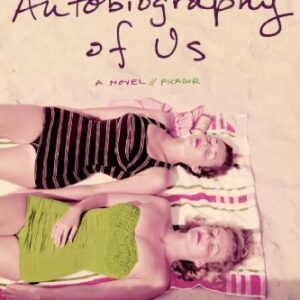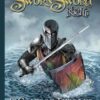Product Description
TWO LIVES. ONE STORY.
Coming of age in the patrician neighborhood of Pasadena, California, during the 1960s, Rebecca Madden and her beautiful, reckless friend Alex dream of lives beyond white gloves and cocktail parties, beyond their mothers’ narrow expectations. As change sweeps the nation—civil rights, Vietnam, women's liberation—the two girls' determination to chart a different course brings them closer, until one sweltering evening the summer before their last year of college, when a single act of betrayal changes everything. Decades later, Rebecca’s haunting meditation on the past reveals the truth about that night, the years that followed, and the friendship that shaped her. A confession of hopes long forgotten, Aria Beth Sloss' Autobiography of Us is an achingly beautiful portrait of a decades-long bond and the victories, sacrifices, and defeats of a generation.
Amazon.com Review
Amazon Exclusive: Maggie Shipstead Interviews Aria Beth Sloss
Maggie Shipstead: What are the origins of Autobiography of Us? Did you start with setting, characters, story? You're a lifelong East Coaster, but the book opens in Pasadena in the 1960s. I'm curious what drew you to that region and era.
Aria Beth Sloss: Autobiography began as a series of questions about my mother, who was raised in Pasadena during roughly the same timeframe. Though I grew up in Boston, my family flew to California every year to spend time with my maternal grandparents, so from a very young age I knew Pasadena as the place where my mother had grown up. It comes as a shock, that moment when you realize your parents were once young. Suddenly, they're people. With that peoplehood comes a past. With that past comes questions, which in my case took on a certain urgency as I entered my twenties. I could say something nobler drove me, but the truth is that I started this book--a book which explores women coming of age during the era in which my mother came of age--out of sheer frustration with what I saw as the limitations facing young women coming of age in my own era. In the end, Autobiography sprang from, as I suppose all novels do, an intensely personal quest.
MS: Rebecca and Alex in your novel have a powerful, permanent friendship but are barbed, even hostile sometimes, in the way they communicate with each other. I find that my friendships with women are rich and important but often also fraught. Did you think a lot about the nature of female friendship while you were writing? Did the writing change the way you think about your own life at all?
ABS: One of the astonishing things that kept happening to me while working on the book was that I kept discovering, and re-discovering, what it was about. It wasn't until two to three years after I started writing Autobiography that I began to see Alex as a central figure. Even then, it took another year for me to understand the relationship between Alex and Rebecca as the book's core. Which is all to say that I was surprised, four years in, to discover I'd written a novel focused on the relationship between two women. It makes sense: I wanted to write about women who came of age in this particular time and place. But I think I also just wanted to write about love. Towards the end of revising, when Rebecca and Alex's relationship had surfaced as the novel's throughline, I found myself nostalgic for the friendships and loves of my early adolescence. There’s a fluidity to one's identity during those teenage years that makes a relationship as intense and conflicted as Rebecca and Alex's possible. Love as a fully-formed adult, with all the boundaries and definitions adulthood requires, is a very different animal. I suppose there's a part of me that mourns the passing of that ability to lose yourself in another human being. It's a precious, dangerous, thing.
MS: I know you're an intrepid editor. How would you describe the novel's evolution from first draft until now? What do you do when you get stuck?
ABS: I'm glad to hear you think of me that way, because editing certainly didn't come naturally. I didn't start writing fiction seriously until I was twenty-five, and as someone who felt the pressure of being a late bloomer, I was fiercely protective of the words I put down on the page. I discovered the power of editing at graduate school, where, under the guidance of a few kind and brilliant teachers, I learned how little those first drafts mean. Those teachers not only took away the sting of tossing out sentences, they also showed me that nothing of any significance happens on the page without time, patience, and perseverance. In writing, as in so much of life, being stubborn is half the battle.
In the case of Autobiography, the word "evolution" is too polite a word to apply to the process this book underwent from start to finish. You'd be better off asking how it is that I managed to drive a train into the ground a dozen--two dozen, three dozen--times and still manage to salvage something resembling a train at the end. That's more or less how it felt. For me, writing a novel meant surrendering any sense of control, and then digging up the courage to assume control. I did this again, and again, and again.
MS: What are some books and writers that influenced Autobiography of Us? Are these the same books and writers that influence you generally?
ABS: I hadn't read Mary McCarthy's The Group when I started Autobiography, but I knew it existed. Just knowing there was a book out there that dealt with the question of how women fit into the framework of American society reassured me there was room in the world for the story I wanted to tell. Kate Walbert's magnificent Our Kind, which I'd read many times, served a similar purpose. Still, I'd be lying if I said I spent those years working on Autobiography looking only to books with similar subject material for inspiration. What I looked for then is what I always look for--a voice I can't shake. Marilynne Robinson is someone I turn to again and again. But there are so many contemporary writers whose work I feel privileged to read. Alongside the old favorites--Charlotte Bronte, Nabokov, Faulkner, Edith Wharton--come new heroes: Sarah Shun-Lien Bynum, Helen Dewitt, Anthony Doerr, Zadie Smith, Andrew Sean Greer, Junot Diaz... on and on. To those who think fiction is a dying art, I say: you're just not paying attention.
 Digabyss.com
Digabyss.com



Reviews
There are no reviews yet.